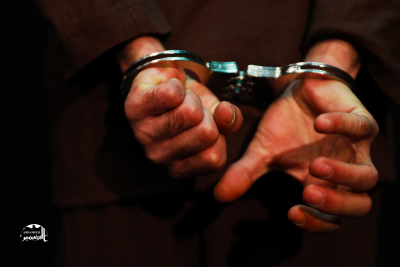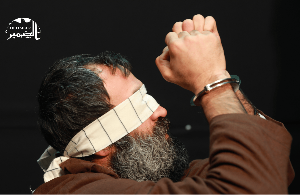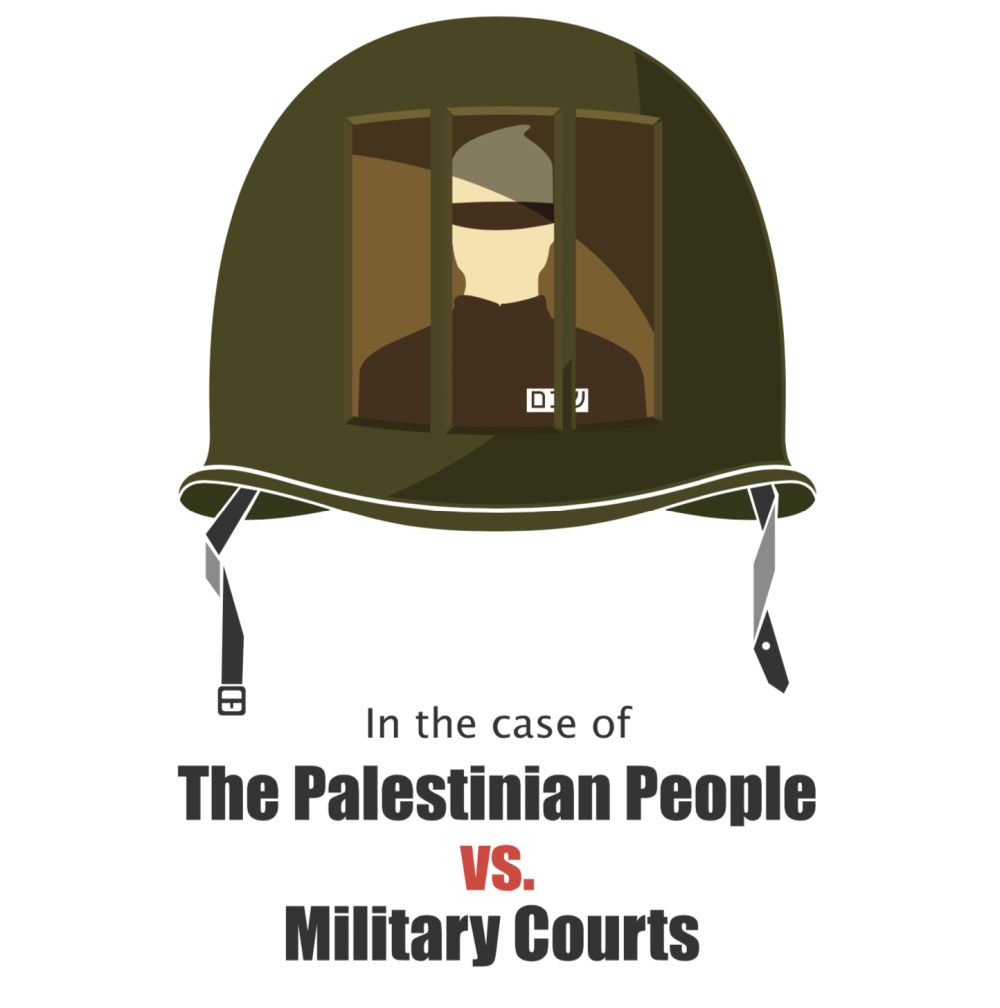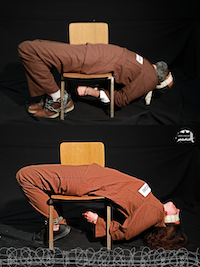
The Israeli occupation and apartheid regime have not ceased their persecution and detention of Palestinians, even as COVID-19 spread across the occupied Palestinian territory. In 2020, the Israeli Occupying Forces arrested 4,634 Palestinians, among them 543 children and 128 women, in addition to issuing 1,114 administrative detention orders.
Moreover, the occupation authorities introduced a set of measures that exacerbate Palestinian prisoners’ conditions under the pretext of preventing the spread of COVID-19: most notably, the isolation of Palestinian prisoners from the outside world by banning visits by their lawyers and families. Conversely, and paradoxically, prison special forces continue to forcibly break into prisoners’ sections, posing a danger to prisoners by increasing their likelihood of exposure to COVID-19 during these incursions.
By the end of March 2021, the number of Palestinian prisoners and detainees reached 4,450, including 37 women, 140 children, and 440 administrative detainees. Among them are 15 journalists, hundreds of university students, and ten Palestinian Legislative Council members.
Palestinian prisoners continue to be subjected to deliberate medical negligence. Many fall victims to this policy and threaten their lives, as was the case with Kamal Abu Wa’ar, who suffered from cancer and contracted COVID-19. Israeli occupation authorities deliberately prolong providing healthcare to Palestinian prisoners, further exacerbating their health conditions, particularly sick prisoners transferred to Ramleh prison clinic, where about 14-16 prisoners stay permanently suffering from poor health and living conditions. In 2020, four Palestinian prisoners were martyred in prison—Nour El-Deen Al-Barghouthi, Sa’ad Al-Gharabili, Daoud Al-Khatib, and Kamal Abu Wa’ar. Since 1967 and to this day, the Israeli occupation authorities continue to withhold the bodies of seven martyred detainees.
Following past years, Palestinian prisoners and detainees faced various occupation policies, most notably arbitrary administrative detention, leading 11 detainees to go on hunger strike to protest this policy. Several other prisoners joined the hunger strike to protest solitary confinement, which is enacted against the prisoners in inhuman conditions.
Isolating Palestinian Prisoners under the pretext of COVID-19 Precautions

Since the outbreak of COVID-19, the Israeli occupation authorities have imposed complete isolation on Palestinian prisoners and detainees. After declaring a state of emergency, detainees were banned from visits by their lawyers and families. The Israeli Prison Service implemented further arbitrary practices and decisions to impose greater repression and control over the prisoners, the most prominent of which has been halting the transfer of prisoners to Israeli military courts for trial. Instead, sessions are held via video conferences, where procedures are marred by clear violations of the right to a fair trial. Besides denying detainees' confidential meetings with their lawyers, trials via videoconferencing often lead to issues where the detainee cannot hear or understand the ongoings of the trial session. Moreover, the lack of precise translation of the proceedings means that detainees lose their right to understand the nature of the charges and evidence presented against them during the session.
The grave violations of Israeli military courts of the rights of detainees is not a recent matter. Since their establishment, Israeli military courts have proven to become an inseparable part of the Israeli apartheid apparatus exercising unjust and illegal practices against Palestinians. The change in procedures following the declaration of the state of emergency further elucidates these violations’ systemic nature, confirming these courts’ integral role.
Also, prison conditions continue to be inhumane and do not align with the bare minimum of adequate living standards. Prisoners and detainees suffer from severe overcrowding, further compounding the vulnerability of Palestinian prisoners and detainees.Initial preventative measures taken by the Israeli Prison Service included the distribution of soap and small containers of chlorine to prisoners, in addition to the sterilization of cells and a reduction of interactions between prison guards and prisoners. Nonetheless, these minimal measures failed to prevent the spread of the virus between prisoners through prison guards and interrogators.
Since the spread of COVID-19, nearly 368 prisoners have been infected across various detention and interrogation centers. The highest numbers being reported in Gilboa, Negev (Ketziot), Ramon, and Ofer prison. In detention centers such as Etzion and Huwara, Palestinian detainees are subjected to harsh conditions. The Occupying Forces quarantined new detainees in filthy cells, with inadequate food (and the lack thereof), along with dirty blankets (and the additional lack thereof) in the face of extreme cold, before transferring them to prison. Furthermore, detainees were not provided with hygiene products such as soap, toothbrushes, and towels.
Palestinian Prisoners and Detainees against a Military Judicial System

Israeli military courts display a significant dependency on the discretion of the Israeli government and intelligence agencies, which has effectively transformed the judicial system into a tool of the occupation to legalize Israeli violations of Palestinian human rights. This impartiality includes confirming administrative detention orders without a real cause for arrest, approving the unnecessary renewal of administrative detention orders, and issuing unusually long sentences against Palestinians.
Military judges’ nominal role highlights military courts’ arbitrariness and the extent of the courts’ violation of fundamental fair trial guarantees, such as the detainees’ right to know the nature of the charges brought against them. In administrative detention, detainees are arrested without knowing the nature of the charges presented against them under the pretexts of “secret files” that the lawyer or the detainee cannot access. This violates their right of defense, as the lawyer, denied access to “secret” evidence, is rendered unable to present an effective defense.

To further compound upon the military courts’ grave violations, military courts avoid evidence of torture in collusion with intelligence services, the military prosecution, and the broader apartheid system. In recent times, and in light of the increasing practice of torture against Palestinian detainees, Israeli military judges, approve the extension of detention of detainees subjected to torture, despite their acquaintance with the physical evidence of torture on the bodies of detainees, and despite detainees’ verbal testimonies of harsh interrogating conditions. Such negligence and action grant further legitimacy to interrogators’ use of physical and psychological torture.
Most recently, the Israeli Attorney General, claiming a lack of an evidentiary basis for criminal charges, closed an investigation against several Shin Bet interrogators in the case of the use of torture during the interrogation of Samer Arbeed. This decision is seen as permitting the use of torture during the interrogation of Palestinian detainees without fear of accountability and the Israeli occupation’s bound by the use of torture despite the absolute prohibition under the UN Convention Against Torture (CAT), signed by Israel nearly 30 years ago. The regime continues to be based on torture, repression, and persecution without any form of accountability.
Accountability does not only fall on those who carry out the act directly but also on those who "fail to take all necessary and reasonable measures within his or her power to prevent or repress their commission or to submit the matter to the competent authorities for investigation and prosecution. Through the International Criminal Court, a new phase of prosecution and legal accountability against those responsible for heinous crimes is provided, allowing an opportunity to attain justice for Palestinian victims of torture.
Beyond the horrific and crimes mentioned above, the Israeli apartheid regime continues to criminalize any acts of resistance to the occupation, such as the criminalization of student organizations and youth groups that engage in union, volunteer, or social-cultural activities. The most recent example is the trials of students alleged to have been members of the “Democratic and Progressive Student Pole” at Birzeit University, a now-banned organization under Israeli military orders, with prison sentences ranging from 12 to 16 months, in flagrant violation of the individual right to union and student activities.
The crimes of the Israeli apartheid regime increase over time, legislating itself to claim a more “legal” form, as the world stays silent, neglecting to expose these practices or ensuring accountability or to work to eliminate this racist regime that stands in front of the Palestinian people’s right to self-determination and freedom from occupation.
Therefore, the time has come for the international community to take the necessary steps to declare this occupation, and all its policies and practices, an illegal reality that must end immediately, along with an end to prosecuting Palestinian civilians in military courts. The Palestinian people’s right to self-determination must be guaranteed, and the occupying power must be held accountable for its ongoing crimes against the Palestinian people.